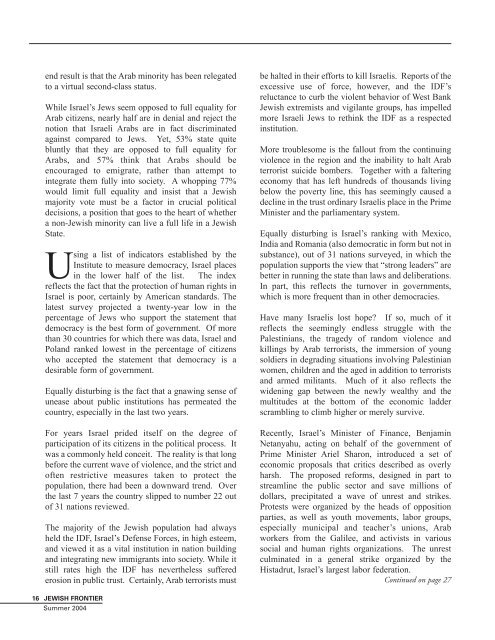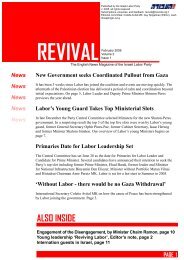Create successful ePaper yourself
Turn your PDF publications into a flip-book with our unique Google optimized e-Paper software.
end result is that the Arab minority has been relegated<br />
to a virtual second-class status.<br />
While Israel’s Jews seem opposed to full equality for<br />
Arab citizens, nearly half are in denial and reject the<br />
notion that Israeli Arabs are in fact discriminated<br />
against compared to Jews. Yet, 53% state quite<br />
bluntly that they are opposed to full equality for<br />
Arabs, and 57% think that Arabs should be<br />
encouraged to emigrate, rather than attempt to<br />
integrate them fully into society. A whopping 77%<br />
would limit full equality and insist that a Jewish<br />
majority vote must be a factor in crucial political<br />
decisions, a position that goes to the heart of whether<br />
a non-Jewish minority can live a full life in a Jewish<br />
State.<br />
Using a list of indicators established by the<br />
Institute to measure democracy, Israel places<br />
in the lower half of the list. The index<br />
reflects the fact that the protection of human rights in<br />
Israel is poor, certainly by American standards. The<br />
latest survey projected a twenty-year low in the<br />
percentage of Jews who support the statement that<br />
democracy is the best form of government. Of more<br />
than 30 countries for which there was data, Israel and<br />
Poland ranked lowest in the percentage of citizens<br />
who accepted the statement that democracy is a<br />
desirable form of government.<br />
Equally disturbing is the fact that a gnawing sense of<br />
unease about public institutions has permeated the<br />
country, especially in the last two years.<br />
For years Israel prided itself on the degree of<br />
participation of its citizens in the political process. It<br />
was a commonly held conceit. The reality is that long<br />
before the current wave of violence, and the strict and<br />
often restrictive measures taken to protect the<br />
population, there had been a downward trend. Over<br />
the last 7 years the country slipped to number 22 out<br />
of 31 nations reviewed.<br />
The majority of the Jewish population had always<br />
held the IDF, Israel’s Defense Forces, in high esteem,<br />
and viewed it as a vital institution in nation building<br />
and integrating new immigrants into society. While it<br />
still rates high the IDF has nevertheless suffered<br />
erosion in public trust. Certainly, Arab terrorists must<br />
be halted in their efforts to kill Israelis. Reports of the<br />
excessive use of force, however, and the IDF’s<br />
reluctance to curb the violent behavior of West Bank<br />
Jewish extremists and vigilante groups, has impelled<br />
more Israeli Jews to rethink the IDF as a respected<br />
institution.<br />
More troublesome is the fallout from the continuing<br />
violence in the region and the inability to halt Arab<br />
terrorist suicide bombers. Together with a faltering<br />
economy that has left hundreds of thousands living<br />
below the poverty line, this has seemingly caused a<br />
decline in the trust ordinary Israelis place in the Prime<br />
Minister and the parliamentary system.<br />
Equally disturbing is Israel’s ranking with Mexico,<br />
India and Romania (also democratic in form but not in<br />
substance), out of 31 nations surveyed, in which the<br />
population supports the view that “strong leaders” are<br />
better in running the state than laws and deliberations.<br />
In part, this reflects the turnover in governments,<br />
which is more frequent than in other democracies.<br />
Have many Israelis lost hope If so, much of it<br />
reflects the seemingly endless struggle with the<br />
Palestinians, the tragedy of random violence and<br />
killings by Arab terrorists, the immersion of young<br />
soldiers in degrading situations involving Palestinian<br />
women, children and the aged in addition to terrorists<br />
and armed militants. Much of it also reflects the<br />
widening gap between the newly wealthy and the<br />
multitudes at the bottom of the economic ladder<br />
scrambling to climb higher or merely survive.<br />
Recently, Israel’s Minister of Finance, Benjamin<br />
Netanyahu, acting on behalf of the government of<br />
Prime Minister Ariel Sharon, introduced a set of<br />
economic proposals that critics described as overly<br />
harsh. The proposed reforms, designed in part to<br />
streamline the public sector and save millions of<br />
dollars, precipitated a wave of unrest and strikes.<br />
Protests were organized by the heads of opposition<br />
parties, as well as youth movements, labor groups,<br />
especially municipal and teacher’s unions, Arab<br />
workers from the Galilee, and activists in various<br />
social and human rights organizations. The unrest<br />
culminated in a general strike organized by the<br />
Histadrut, Israel’s largest labor federation.<br />
Continued on page 27<br />
16 JEWISH FRONTIER<br />
Summer 2004




